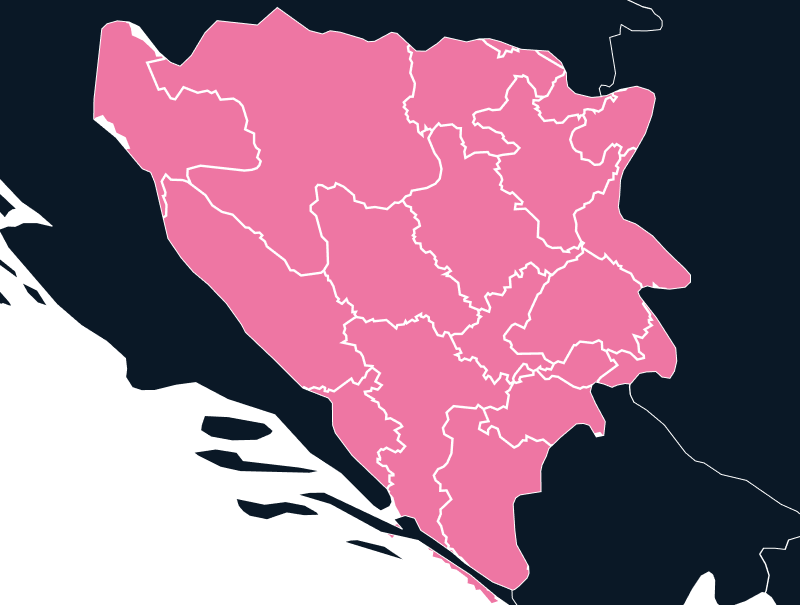Europe
Import and Export to Bosnia and Herzegovina
Importing and exporting to Bosnia and Herzegovina involves navigating a complex web of regulations, administrative hurdles, and evolving compliance standards. If you’re looking to expand your business in this region, understanding Bosnia and Herzegovina customs regulations and the country’s import/export landscape is essential.

Tax
Up to 18%
Duty
Up to 15%
Lead Times
3-4 Weeks
Restricted Items
Second-Hand Goods; Wireless Goods
Best Carrier Option
Courier or Freight Forwarder
Non-Working Days
Saturday, Sunday, and Public Holidays
Prominent Languages
Bosnian, Croatian, and Serbian
The Trade Landscape of Bosnia and Herzegovina
A combination of historical influences, geographic advantages, and ongoing economic development shapes Bosnia and Herzegovina’s trade environment. While the country benefits from its proximity to major European markets, it also faces challenges rooted in its administrative structure and legacy systems. The nation’s economy is still heavily reliant on primary goods exports, making diversification and trade facilitation crucial for growth.
One of Bosnia and Herzegovina’s key advantages is its trade agreements. It enjoys preferential access to the European Union market and participates in the Central European Free Trade Agreement (CEFTA), which includes countries like Albania, Croatia, and Moldova. These agreements open doors for smoother trade flows and tariff benefits, presenting lucrative opportunities for exporters and importers alike.
Population
3.14 M
Biggest Industry by Export
Machinery and Transport Equipment
Capital City
Sarajevo
Biggest Industry by Import
Refined Petroleum
Understanding Bosnia and Herzegovina Customs Regulations
If you’re importing into Bosnia and Herzegovina, it’s vital to understand the customs regulations that govern the process. Bosnia and Herzegovina customs regulations require all imported goods to be accompanied by a customs declaration completed in one of the three official languages — Bosnian, Serbian, or Croatian. This declaration must be submitted by the importer or their authorized representative and supported by relevant documentation, such as invoices, shipping papers, and quality certificates.
The customs office has the authority to inspect shipments and may take samples to verify that the goods match the declaration. This process can sometimes introduce delays if documentation is incomplete or goods do not meet the specified standards.
Furthermore, the country applies a value-added tax (VAT) of 17% on goods placed in free circulation, which is a critical cost factor to consider when calculating import expenses. Notably, Bosnia and Herzegovina’s import tariffs are harmonized annually with EU legislation, reflecting the country’s ongoing alignment with European trade practices.
Countries That Trade with Bosnia and Herzegovina
Europe
Croatia
Europe
Serbia
Specialized Import/Export Solutions for Bosnia and Herzegovina
Our expert compliance team is well-versed in Bosnia and Herzegovina customs regulations and trade policies, enabling us to provide tailored support that simplifies your logistics.
Customs Clearance Expertise:
We manage every detail of customs documentation and inspections to ensure your goods clear customs smoothly.
Up-to-Date Regulatory Knowledge:
We keep you informed of the latest trade reforms and requirements, including tariff harmonization with the EU and adherence to legacy standards.
Language Support:
We ensure all customs documentation is correctly prepared in the appropriate language, preventing costly delays.
Why Bosnia and Herzegovina is Worth the Effort
Despite the challenges, Bosnia and Herzegovina offers significant growth potential. The country is actively reforming its trade policies as it prepares for WTO accession and future EU membership, aiming to streamline customs procedures and reduce barriers. Additionally, infrastructure projects like Europe’s first underwater internet cable reflect the country’s commitment to modernization and digital economy growth, signaling an improving business environment.
By partnering with TecEx, you can capitalize on Bosnia and Herzegovina’s trade advantages while we handle the complexities. From CEFTA benefits to VAT handling and customs documentation, we untangle the regulatory maze so you can focus on scaling your business.
Ready to Simplify Your Import/Export to Bosnia and Herzegovina?
If importing/exporting to Bosnia and Herzegovina feels daunting, it’s time to make TecEx your trusted compliance partner. We’re here to ensure your shipments navigate Bosnia and Herzegovina customs regulations effortlessly.



